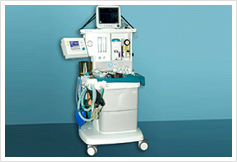Anaesthesiology
The department of Uro/Nephro-Anaesthesia has skilled Anaesthesiologists who have been working in this field for over 20 years. They are specialized in managing newborn children, adults and patients with renal failure, who require interventions and surgery. The department is also well-equipped with the required monitoring equipment to support tertiary care Urology.
The word 'anaesthesia' means 'without feeling pain'. It refers to a variety of methods used to make an operation painless for the patient.
Conditions Treated:
The Anaesthetist will interview you prior to your surgery to determine the best combination of drugs and dosages for you and also to determine how much monitoring would be required during the procedure to ensure the safety and effectiveness of the procedure. He will ask you regarding:
- Any allergies (such as with respect to foods and drugs)
- Neurological conditions (such as epilepsy and stroke)
- Chronic heartburn and reflux
- Teeth (such as any loose teeth, dentures, and bridgework)
- Heart disease (such as heart attack, angina, chest pain, high blood pressure or a family history of any of these problems)
- Asthma, emphysema or any other lung/breathing problems
- Arthritis
- Present medications being taken
- Surgeries in the past and any problems with anaesthesia
- Endocrine system disorders such as diabetes, thyroid disorders
Pain management in the post-operative period is one of the vital functions performed by the Anaesthetist to keep the patient pain-free and as comfortable as possible during recovery.
Various pain-relieving techniques are used:
- Continuous Caudal Epidural Anaesthesia: in continuous caudal epidural anaesthesia, a catheter is placed in the caudal epidural space and local anaesthetic drugs are injected through it. This is particularly used in paediatric patients.
- Epidural Anaesthesia: In epidural anaesthesia, local anaesthetic and narcotic analgesics are injected via a catheter placed near the spinal cord. This is used in patients who undergo major surgeries, laparoscopic surgeries, etc.
- Patient-Controlled Analgesia: In patient-controlled analgesia, analgesic drugs are filled in a dispenser that is connected to an IV canula. The patient can press the button on the dispenser when he feels pain.
The role of the Anesthesiologist in the OR is to:
- Provide a continual medical assessment of the patient
- Monitor and control the patient’s vital life functions such as heart rate, heart rhythm, respiration, blood pressure and body fluid balance
- Control the patient’s pain and the level of unconsciousness to make conditions ideal for a safe surgery
Depending upon the type of surgery and the patient’s medical condition, the Anesthesiologist will decide upon the anaesthetic technique (such as for paediatric patients, patients with renal failure, for renal transplant surgery, laparoscopic surgery and for geriatric patients)
This technique provides pain relief as well as relief of anxiety that may accompany some treatment or diagnostic tests. When the patient is administered sedation analgesia, the patient may be drowsy but he or she may be aware of his or her surroundings. This technique is used for:
- Lithotripsy
- Urodynamic studies in Paediatric patients
- Renal Biopsy
Equipment
- ECG Monitor: to monitor heart rate and its electrical activity.
- Blood Cuff: a blood cuff around the patient’s upper arm to check his or her blood pressure.
- Pulse Oximeter: to measure the amount of oxygen in the blood.

For further information click the link: General Anesthesia &
You
Spinal and Epidural
Anesthesia